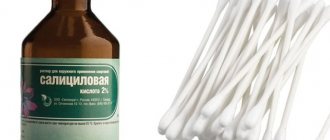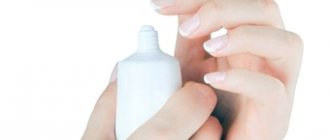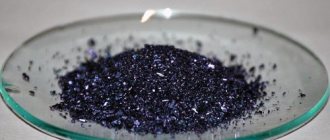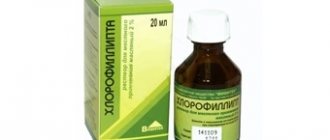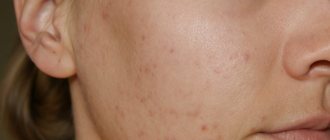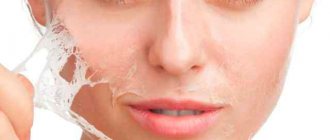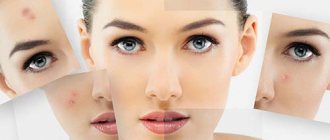In cosmetology, sulfur is called the “mineral of beauty.” As a component of protein and the amino acids that synthesize it, sulfur is an essential trace element, without which the regulation of metabolic processes is impossible. When the body's sulfur reserves are depleted, hair becomes dull and skin ages. This is due to the presence of sulfur in keratin, which is responsible for hair health, and in amino acids, which have an antioxidant effect on the skin. If not enough sulfur enters the body, this may manifest itself in other cosmetic skin defects. For example, acne may appear. Therefore, sulfur cleanses the face of acne and is used for this in different forms and compositions.
Acne sulfur in human history
At first, it was believed that the benefits of sulfur for acne were proven only in 1949. Several later studies in the 1950s confirmed this.
But we do know that sulfur has been used in skin care for thousands of years. There are documented stories of Romans bathing in warm water filled with sulfur. This is how they dealt with acne symptoms.
The ancient Egyptians used sulfur in various ointments to treat eczema and acne almost 5,000 years ago. Traditional Chinese medicine also mentions this beneficial mineral in skin ointments, which was known more than 2000 years ago.
Since the 1950s, sulfur has been added to various foams for application directly to problem skin.
It retains its worldwide popularity in acne treatment products, although it has fallen out of fashion for several years. Nowadays, sulfur can be found in sulfur-containing oils, ointments, masks, talkers, and more. Fortunately, many manufacturers of medicinal cosmetics have been able to reduce the unpleasant odor of their products.
It is generally used as a treatment for problem skin, but not as a primary treatment as it often causes dryness and irritation. Some patients cannot tolerate these side effects.
To understand why sulfur is such a popular skin treatment, we need to determine how effective and safe it is?
Firstly, sulfur against acne is effective because even when applied topically, it easily kills bacteria.
Secondly, it is a known keratolic because it gently removes the top layer of skin along with dead cells, thereby revealing a fresh layer of flawless skin. Many cosmetologists praise this mineral as a natural exfoliant.
What's the benefit?
Sulfur is used not only in its original form, but is added to cosmetic products (masks, scrubs, tonics, creams). This is because the use of such products has a positive effect on the condition of the skin. The main properties of this chemical element are:
- responsible for the oxygen balance of the skin;
- promotes acne maturation;
- cleanses and tightens pores;
- eliminates dead cells;
- prevents the development of bacteria.
For healthy hair, nails and skin, keratin is needed, in which sulfur is a structural element.
What is sulfur?
It appears as a yellow crystalline solid. Although it is not soluble in water, sulfur is one of the most versatile elements in forming compounds.
It reacts and forms compounds with all elements except iodine, tellurium, platinum, gold, iridium, nitrogen and noble gases.
Sulfur is abundant and found throughout the universe, but is very rarely found in pure, uncombined form on the surface of the Earth.
As a chemical element, it is present in sulfate and sulfide minerals. This occurs in the dissolved ions of many waters. In addition, it is an important component of many atmospheric, underground and dissolved gases.
Sulfur is an essential element in all living things and is found in the organic molecules of all fossil fuels.
About 90% of sulfur is used to produce sulfuric acid. The rest is used to produce a variety of products: hydrogen sulfide, insecticides, pharmaceuticals, soap, textiles, paper, rubber, gunpowder, dyes and food preservatives.
Sulfur is extremely common and is present everywhere:
- it is the 11th most abundant element in the human body;
- 6th most abundant element in seawater;
- 14th most abundant element in the earth's crust;
- 9th most abundant element on all of Earth;
- 10th most abundant element in the universe.
According to the International Mineralogical Association database, more than 1,000 minerals contain sulfur in their composition. This characterizes the ability of sulfur to form compounds with many chemical elements.
As a result, sulfide, sulfarsenide, sulfosalt, sulfate and hydrosulfate minerals are formed. For example, bornite, pyrite, cobaltite, arsenopyrite, proustite, pyrargyrite, anhydrite, celestite, gypsum, kieserite, epsomite, etc.
Food sulfur, purified, for the treatment of acne - 550 rubles. 300 g.
Sulfur is an important component of some amino acids (methionine, cystine and cysteine), vitamins (biotin, B1), as well as other biologically active substances such as taurine, heparin, coenzyme A, insulin, lipoic acid and chondroitin sulfate (component of cartilage, bones, ligaments and blood vessels).
— Sulfur is concentrated in tissues with a high protein content. — It is a component of the collagen protein (skin, nails and hair, read about proper hair care), so it is also called the “element of beauty.” — Sulfur is involved in the formation of keratin, a protein found in joints, hair and nails. — Sulfur enters the human body in the form of organic compounds and amino acids. - It is poorly absorbed by the intestinal walls and is difficult to excrete - this is due to the formation of mucopolysaccharidosis - chondroitin sulfate. — Penetration occurs much faster through the skin than through the intestinal wall. High concentrations of Sulfur compounds in the air (hydrogen sulfide, sulfur dioxide, carbon disulfide) quickly penetrate the epidermis, and there in the deeper layers (dermis and hypodermis) they are converted into sulfides and sulfates. Then they enter the bloodstream and are excreted by the kidneys. — Sulfur is part of almost all proteins and enzymes in the body, participates in redox reactions and other metabolic processes, and promotes the secretion of bile in the liver. — There is a lot of sulfur in hair. - Sulfur atoms are part of thiamine and biotin - B vitamins, as well as vital amino acids - cysteine and methionine. — Normalizes metabolic processes; — Increases immunity; — Stabilizes glucose levels; — Maintains oxygen balance; — Has anti-allergic, wound-healing and anti-inflammatory effects; — Increases resistance to radio radiation; — Promotes the secretion of bile by the liver; — Neutralizes and flushes out toxins and waste from the body; — Affects blood clotting; — Important for a number of vitamins, amino acids, enzymes and hormones; — Sulfur improves the functioning of ligaments and joints; — Strengthens muscle tissue; — Reduces joint and muscle pain, cramps.
HOW TO TAKE SULFUR? Sulfur for medicinal purposes must be purchased exclusively at a pharmacy. You can only take purified (medical) sulfur or precipitated sulfur. Both affect the body in exactly the same way, their action is identical. But it is preferable to use purified sulfur, since the precipitated sulfur is too fine and this often causes increased gas formation. There are general recommendations for taking sulfur. It is enough to take regularly 0.25 g every day with meals (per 70 kg of body weight). This dose is best divided into several doses. At the pharmacy, you can ask the pharmacist to divide the daily dose of the drug for you, and at home, divide it into parts. To treat skin diseases, sulfur is used in the form of a mash called Vidal's milk. It contains 5% of the substance. It is prepared exclusively according to a doctor’s prescription to order. Should be used 1-3 times a day, as prescribed by your doctor. For children, sulfur is mixed into drinks or food. It is important to make sure they do not inhale it as the powder is too fine and can cause choking.
HOW TO TAKE SULFUR INSIDE? There are several types of medications containing sulfur for oral administration. You can drink it in its pure form. In tablets in the form of dietary supplements, which are much more expensive than the usual substance, but are much more efficiently absorbed by the body. In yeast, which will be especially relevant in the treatment of acne, hair loss, etc.
Before use, you should be careful, as it can stain your skin and clothes. Sulfur has an unpleasant odor and in some cases causes irritation. HOW TO DRINK SULFUR FOR ACNE? There are several rules that should be followed for effective treatment. To treat acne, only purified medical sulfur can be used. Never use precipitated or feed sulfur. Do not take more than 1 gram of the substance at one time. It is best to stick to a dosage of 0.5 g. You should take sulfur no more than 3 times a day and only with meals. Supplement your sulfur intake with enterosorbents, which will combat possible increased gas formation. If gases cause a lot of discomfort, reduce the frequency of intake. The course of treatment cannot last more than a month. If there is no result, stop taking it and consult your doctor. NATURAL SOURCES OF SULFUR It is worth remembering that sulfur can not only be bought at the pharmacy, but also obtained naturally from food. The substance is found in large quantities in products of animal origin, primarily in eggs, meat and poultry. It can also be obtained from onions, garlic, cabbage, seeds and sprouted wheat. Add these foods to your daily diet and you can forget about many problems.
HOW TO UNDERSTAND THAT YOU NEED SULFUR? Sulfur deficiency is immediately visible to the naked eye. To do this, it is not necessary to undergo a lot of tests. The following symptoms should alert you: Increased oiliness of the skin, the appearance of acne. Allergic skin rashes, psoriasis, eczema. Sulfur can help you say goodbye to skin problems, greasy shine and multiple inflammations. Excessive hair loss, brittle nails. Increased fatigue and deterioration of the body's protective functions. Liver diseases, diabetes Allergic reactions that manifest as a rash.
Sulfur: role and significance, daily requirement, deficiency and excess, sources of sulfur, sources of sulfur
Sulfur and its sulfur compounds are common in nature and have therefore been known since ancient times. People could become familiar with the smell of burning sulfur during volcanic eruptions, and with the unpleasant smell of hydrogen sulfide by finding sources of sulfur water. It was believed that sulfur was a product of the underground gods, so the priests used it in religious rites as sacred incense. Sulfur has also long been used in various flammable mixtures during military operations. At first it was the fumes of burning sulfur, bringing death to all living things. Then the Chinese came up with gunpowder that included sulfur, and from that moment on, the industrial use of natural sulfur and its extraction from pyrites began. Daily requirement and sources of sulfur All living organisms contain sulfur, that is, it is a biogenic element of vital importance. In the animal body it is from 0.5 to 2%, in plants from 0.3 to 1.2%, in the human body 2%. This chemical element is found in hair, nails, skin, bones, and nerve fibers. And a person needs about 4 grams of it per day. Sulfur comes from food and is used to build protein molecules and many enzymes. It is present in foods such as nuts, garlic, cabbage, onions, radishes, egg yolks, buckwheat, gooseberries, and chili peppers. These products are common in the diet of Russian citizens, so a lack of this element in the body rarely occurs. But if this happens, it is expressed in increased fragility of the nails, loss of elasticity and shine of the hair, and manifestations of neurasthenia. It is also strongly recommended to additionally consume this list of products if you have high blood sugar and joint problems.
Medical use Sulfur is one of the most common elements used both independently and in ointment recipes to eliminate skin diseases. Everyone knows sulfur ointment. This simple remedy is known to everyone. You can easily prepare it yourself by taking one teaspoon of sulfur and two teaspoons of fat cream, olive oil, lard or petroleum jelly mixed with water. The effect of sulfur in this ointment is due to interaction with organic matter on the surface of human skin, resulting in the formation of sulfides that restore the epidermis and acid with a powerful antimicrobial effect. Basically, sulfur ointment is recommended by dermatologists to get rid of scabies or dermatitis in infants, nursing mothers or pregnant women, and people with allergic reactions to other medications. For these categories of patients, sulfur ointment does not pose any danger. Before using sulfur ointment, you should thoroughly wash the affected area of skin or the entire body with warm water and soap, then apply the ointment without rubbing too much, and leave for a day. Before each new use, take a shower or bath. The big disadvantage of sulfur ointment is its smell, which does not disappear even after washing the clothes, so you just have to throw away the clothes. But it is safe, cheap and helps well. In addition to sulfur ointment, two types of sulfur are used in classical and folk medicine: purified and precipitated. Purified - has the form of a yellow powder that dissolves well in water. This sulfur can be used internally. This is an excellent remedy against worms. It is also used externally as a powder. Dry purified sulfur is used to powder skin areas to treat skin problems such as psoriasis, seborrheic eczema, and skin inflammation caused by scabies mites. Precipitated sulfur has the appearance of a pale yellow powder of the finest fraction, does not dissolve in water, and has no characteristic odor. For external use only as an ingredient in ointments and powders. It is strictly forbidden to take it orally to avoid disruption of the digestive system. Bloating, nausea, vomiting, headache are symptoms of sulfur poisoning. At the same time, purified sulfur does not cause such side effects when taken orally. It is used as a mild laxative, enhancing intestinal motility due to hydrogen sulfide and sulfur alkali. Hydrogen sulfide baths This is a type of joint treatment of various diseases used in balneotherapy for a very long time. Natural mineral waters are mainly used. There are many resorts based on the use of such waters, both in our country and abroad. The concentration of hydrogen sulfide determines what diseases baths will be taken against. Hydrogen sulfide is absorbed into the human blood through the skin and irritates nerve endings, which leads to improved functioning of various human organs.
Hydrogen sulfide baths are suitable for people with diseases of the central and peripheral nervous system, hypertension, urological and gynecological diseases, and diseases of the musculoskeletal system. They are also used for certain skin diseases, diabetes, varicose veins and to improve general metabolism. Despite the very wide range of applications of hydrogen sulfide baths, the list of restrictions is also large. Such baths should not be used by people with heart defects, coronary artery disease, kidney and liver diseases, tuberculosis, cancer, stomach ulcers, bronchial asthma, hyperthyroidism.
The smart one doesn't crush pimples, the smart one applies sulfur against pimples and boils! Sulfur is famous for its powerful exfoliating and drying properties. Sulfur has an antiseptic and anti-inflammatory effect, which obviously will not appeal to pimples, blackheads, boils and other “comrades”.
Sulfur can be used both externally and internally. It costs a penny, rarely causes allergies and gives a good effect. Why not try it?
Does sulfur help with acne and why?
Sulfur is a chemical element on which the condition of the skin largely depends. If there is a deficiency of this element, the skin becomes flabby and dull over time, and its protective functions are reduced.
Here are the beneficial properties of sulfur:
A weak but mild antiseptic effect is the main reason for using medical purified sulfur for acne. Sulfur inhibits the growth of bacteria and destroys “all evil spirits”, which are the causative agent of acne and inflammation. Anti-inflammatory. Sulfur soothes the skin, relieves inflammation in pimples, helping them mature faster. Exfoliating. Sulfur delicately removes dead skin cells and promotes skin renewal after acne. Vivid drying effect. Sulfur dries the skin very much, so you need to use it carefully. That's why people with oily skin love sulfur so much. In addition, sulfur is directly involved in many metabolic processes in the body and supports the normal functioning of the digestive and nervous systems. As we can see, we have the prerequisites for using purified sulfur in the treatment of acne.
The best ways to use sulfur against pimples, blackheads and acne
purified sulfur used for acneSulfur as a remedy for acne is used both externally and internally. Below you will find the best recipes and methods for using sulfur. It will be interesting!
Sulfur talk - a killer acne remedy
The main advantage of the acne powder with sulfur is its availability. You can purchase all the necessary ingredients at any pharmacy for very little money.
And the effect, if you listen to numerous reviews, exceeds all expectations (of course, with regular use).
Here is the most effective recipe for mash with sulfur (the required ratio of ingredients is indicated):
2% boric acid solution – 1 share; chloramphenicol powder – 2 shares; sulfur powder – 2.5 shares; aspirin powder – 2.5 shares; ethyl alcohol Quantum Satis. To prepare sulfur mash for acne, mix all the above ingredients, shake thoroughly and pour into a dark glass container. Apply to face 1-2 times a day.
This mash has a strong antiseptic and anti-inflammatory effect. In addition, the product dries the skin and stimulates skin restoration.
Important! You should not wipe your face with this mash before going outside, as a yellowish tint may appear on the skin.
By the way, using sulfur ointment for acne instead of mash is a safer solution for the skin. Be sure to read the adjacent article, since in some cases, ointment is better for you (primarily, this applies to those with dry and sensitive skin).
Taking medicinal sulfur internally as a remedy for acne
A strong positive effect from this method can be expected by those whose acne is caused by impaired functioning of the digestive system and metabolic failures.
Here are some recommendations on how to drink sulfur correctly to get rid of acne:
To treat acne, only purified medical sulfur is used. The maximum single dose is 1 gram. The frequency of taking sulfur is 2-3 times a day (everything is individual here). Medical sulfur should be consumed exclusively with meals. A side effect such as gas formation may occur. In this case, enterosorbents, for example, enterosgel or regular activated carbon, should be consumed twice a day.
How does sulfur treat acne?
To understand how sulfur combats an acne diagnosis, it is necessary to understand how these pesky pimples occur in the first place.
Hormonal changes and other factors increase the production of androgens (such as dihydrotestosterone, which stimulates the production of more sebum).
When too much sebum is produced, pores become clogged. In turn, this creates a favorable environment for bacteria, and they begin to multiply.
As a result, due to the body's immune response, pimples swell and become bright red. You can read more about the mechanism of acne here.
Sulfur dries out the skin. Since acne is caused by excess sebum production in the sebaceous glands, sulfur can help those who have oily skin and frequent breakouts.
It is also an excellent keratolytic. When applied topically to the skin, it causes the top layer of the epidermis to dry out and gradually peel off. This removes dead skin cells, unclogs pores and leaves them unblocked. A new layer of smooth skin grows in place.
Sulfur also has antibacterial properties, helping to fight p. acnes.
However, sulfuric acid treatment is not suitable for all skin types and acne. Many dermatologists believe that the use of sulfur for acne is justified only for people with oily skin, since it greatly dries it out, eliminating excess oil that clogs the pores.
In contrast, sulfur treatment may have a negative impact on patients with combination or dry skin, as the excess drying effect will lead to painful irritation and flaking of the skin.
Acne sulfur is effective for mild to moderate acne, but is unlikely to help with cystic breakouts and more serious problems. Although it can be used spot on acne, especially in the form of an ointment, to reduce drying.
In addition to treating acne, sulfur is used for seborrheic dermatitis, rosacea, eczema and dandruff. That is why it is often added to various shampoos and soaps.
Sulfur water
This medicine has the majority of positive reviews. This is due to its beneficial effect on problem areas of the skin. The main disadvantage of sulfur water is that it is quite difficult to purchase. But, with the development of technological progress, this drawback gradually began to disappear - now there is the Internet, which will allow you to find a medicine quickly enough. To achieve the effect, you should wash your face with this water several times a day.
The ointment can be purchased at a pharmacy chain or made yourself. It is strictly forbidden to take it orally. To prepare, we will need sulfur tablets and petroleum jelly: the tablets are crushed into powder, after which oil is added to them until the substance becomes mushy.
Before starting treatment, it is necessary to perform allergy tests, that is, to make sure that there is no allergy. To do this, apply a thin layer to the elbow bend before going to bed, and in the morning the condition of the skin is assessed. If there are no marks on this place, then the ointment can be used. It is recommended to purchase pharmacy ointment and use the included instructions.
There are certain contraindications for treatment with sulfur. Typically, this group of people includes pregnant and lactating women, as well as children who have not reached the age of three.
Is sulfur effective for acne?
Sulfur is not 100% a cure, since what is beneficial to some people may be harmful to others. For dry and sensitive skin types, products containing sulfur can only be harmful.
The same properties that make it effective in fighting acne can simultaneously cause many other skin conditions. Sulfur has a high pH balance, which can disrupt the skin's protective barrier. As a result, this leads to loss of moisture and the appearance of new bacteria in the pores.
As we all know, acne is a special type of skin disease. This skin condition occurs when hair follicles become clogged with oil and dead skin cells.
There are different treatments for acne, and although we are now looking at the essence of sulfur, the treatment must be prescribed by a qualified doctor. The patient can simply waste time and get lost in the variety of all treatment methods, which, moreover, do not always give a positive effect.
Sulfur is one of the world's oldest treatments for skin conditions. It is used in powder or ointment form. According to recent data, sulfur is considered one of the most effective ways to treat acne.
How and from what diseases does medical sulfur help?
Medical sulfur is a yellow substance in the form of powder. This macroelement is normally found in the cells and tissues of a healthy body, taking an active part in its normal functioning. There are also a large number of foods rich in sulfur, which, when consumed, can replenish its reserves in the body.
A person should receive at least one gram of this substance per day, the benefits of which are invaluable, in order to feel full of vital energy and health. However, if there is a significant shortage of sulfur, it is very difficult to restore the required amount in the body if you only resort to a special diet.
This will require more serious measures, for example, taking this substance orally.
What are the healing properties of sulfur for humans?
The chemical element in question affects the condition of the digestive organs, nervous system, and its absence is indicated by problems with hair, skin and nails.
With a lack of sulfur in the body, pimples and blackheads appear on the face, the skin becomes problematic, loses its firmness and elasticity. A sufficient amount of this substance helps strengthen the body's defenses, helping in the fight against pathogens.
A positive effect of sulfur on blood clotting and the production of bile, which is important for the digestion of incoming food, was also noted.
The following effects of sulfur on the human body are noted:
- Stimulates brain activity.
- Cleansing.
- Antihistamine.
- Promotes cellular respiration.
- Improves bile production.
- Stimulating the process of collagen production.
- Antiseptic.
- Painkiller and anti-inflammatory.
- Antihelminthic.
- Anti-acne.
- Keratolytic.
- Antiseborrheic.
Pharmacies sell various medications made on the basis of sulfur, for example, ointments and acne creams, which effectively combat this problem that is pressing among many people. The chemical element in question is also involved in the process of blood clotting and helps maintain the normal condition of human hair and epidermis, for which it is called a beauty mineral.
Sulfur is an important component of metabolism, is part of various enzymes, hormones, vitamins and amino acids, promotes the normal functioning of the nervous system, strengthens the immune system, and also regulates human blood sugar levels.
With sufficient sulfur content in the body, the aging process slows down, and increased resistance to radiation and other unfavorable external environmental factors is noted.
Sulfur and acne
This remedy is indispensable in the treatment of acne and pimples. The high effectiveness of sulfur powder against these ailments, which cause severe discomfort, both physically and psychologically, has been noted.
Pharmacies sell a special sulfur ointment, the indications for use of which are demodicosis (subcutaneous mites), acne, seborrhea, boils, and various fungal skin infections. Sulfur powder can also be mixed with alcohol or lotion to apply to affected areas, since in dry form this substance has no healing effect.
The remedy in question against dermatological diseases is recommended for use both internally and externally to speed up the therapy process. The following effects occur on the epidermis:
- antiseptic;
- soothing;
- drying;
- renewing.
The use of medical purified sulfur to maintain normal functioning of the body, as well as to treat certain pathologies, is advisable only after consultation with a competent specialist, even despite the absence of possible side effects and a minimal number of contraindications.
Features of sulfur treatment
1) Sulfur mask for cystic acne
If you're unlucky enough to have cystic acne, don't despair. Now, with a simple remedy, this problem can be solved or at least significantly improved. The anti-inflammatory properties of sulfur help to quickly and effectively respond to the outbreak.
Sulfur works well for acne in the form of a mask. You can buy a ready-made mask (there are many of them) or make your own. To do this, you will need sulfur powder and emollients: glycerin, essential oils, aloe vera gel, lecithin, as well as vitamins A and E that are beneficial for the skin.
You will have to use such a mask for a long time (a couple of months), because cystic acne cannot be cured quickly.
2) From scars
One must be very careful when treating with sulfur. Of course, it gently exfoliates the skin. With regular use, scars may appear less noticeable and may be difficult to notice with the naked eye.
But some people's skin may become discolored. During treatment, it is necessary to constantly monitor the amount of substance applied and the frequency of use.
3) Sulfur soap
Now you can even find soap with added sulfur. It is quite beneficial in treating acne as it directly removes dead skin cells, which in turn clog the pores.
Although soap is gaining popularity due to its ease of use, it must be remembered that it is still soap. For small acne, sulfur-containing soaps are really effective, but when it comes to severe acne with deep subcutaneous elements, you are unlikely to see results soon.
4) During pregnancy and breastfeeding
There have been no scientific studies regarding the use of sulfur in pregnant women. We know that sulfur is slightly toxic to animals and humans, although we cannot be sure for all drugs based on it.
It can still have serious adverse effects on the unborn child, so always consult your doctors before choosing any medications. Breastfeeding also may not be completely safe for the baby.
5) For sensitive skin
For dry, normal and sensitive skin, sulfur is not the best treatment option. This is mainly due to side effects, the most common being dryness and skin irritation.
So, it will all depend on whether your skin can tolerate such an aggressive treatment.
Sulfur: benefits and harms, instructions for use, role in the body
The benefits and harms of sulfur lie in the effects of sulfur-containing drugs on the body.
In order to understand their effect on health and learn how to use it, it will be useful to learn about the role of this substance for our body.
What is sulfur and its role in the body
Sulfur, S (full name sulfur), is a macroelement assigned atomic number 16 in the periodic table.
This substance, known for its fetid odor in compounds and flammable properties, plays an important role in humans, being part of amino acids such as methonine, cystine, vitamins (for example, thiamine), hormones and enzymes (for example, insulin).
In the human body, the proportion of sulfur is 0.25% of the total mass.
Sulfur itself is not toxic, but compounds of the element with other chemical components, such as hydrogen sulfide, are poisonous.
It plays a key role in blood clotting. Its beneficial properties include protecting protoplasm from bacteria.
As part of the body's compounds, sulfur has benefits for the growth of hair, nails, skin, and also in protecting the body from aging.
Application of sulfur
Sulfur has been used to treat humans since ancient times. Modern medicine uses a number of medicines containing this element and its compounds. For example:
- natural hydrogen sulfide baths have a beneficial effect on the body;
- sodium thiosulfate solution is used to treat scabies, neuralgia, arthritis;
- streptocide and phthalazole serve as antiseptic drugs.
Sulfur is used to produce medicinal soap, which has an antiseptic and drying effect. Purified, or medical, sulfur is used to fight parasites, intestinal diseases and frequent constipation.
Sulfur is used to treat eczema, furunculosis and demodicosis. Hair and anti-dandruff masks are made from it: the element acts as a hair growth stimulator and also eliminates oiliness.
Advice! Doctors recommend therapy using sulfur two to three times a year.
Indications for use
Doctors prescribe treatment for sulfur when it is deficient in the body. Medicines made on the basis of the element have an antiseptic and antibacterial effect; they are used for the treatment of scabies, fungal diseases, and juvenile acne.
The healing properties of sulfur are recommended for use by people suffering from rheumatism and osteoarthritis. The main thing is to follow the recommendations for use, since an overdose of the drug can cause harmful intoxication.
How to use sulfur
Sulfur-containing drugs are taken simultaneously with food.
You should only buy purified sulfur from the pharmacy.
Feed sulfur preparations for animals are not intended for human consumption.
The optimal course of treatment would be 1 month. If there is no expected benefit, you should stop taking it until you consult your doctor.
Important! Sulfur is used as prescribed by a doctor in the recommended dosage. Self-administration and prescription of the drug is not recommended.
Sulfur powder for oral administration
Powder for internal use is prescribed for chronic diseases:
- polyarthritis;
- sciatica;
- haemorrhoids.
Sulfur for oral administration is purified and comes in tightly sealed jars. Taking purified sulfur is also prescribed for the treatment of enterobiasis.
Medical purified sulfur, or sulfuric anhydride, is beneficial in cases of:
- restoration of the body's defenses;
- for expectorant purposes: hydrogen sulfide is absorbed through the intestines and enters the lungs through the blood;
- for constipation, purified sublimated sulfur is prescribed;
- to enhance the body’s ability to neutralize weak poisons.
When taking sulfur, you can drink enterosorbents if you wish: they will reduce the harm of frequent gas formation that the drug can cause.
Products containing sulfur
Many organic products contain this useful element. Their daily use can bring benefits comparable to taking sulfur powder orally:
- bulb onions;
- peas;
- a pineapple;
- zucchini;
- tomatoes;
- turnip;
- watermelon;
- nuts.
Quail and chicken eggs contain the largest amount of the element.
There are also useful organic sulfur supplements on the market, such as chewable Siberian larch gum.
Daily intake of sulfur
The consumption rate for the benefit of the body is from 500 mg to 1 g per day. The dose for athletes due to increased physical activity is increased to 3 g per day, and mineral water containing sulfur is also prescribed in the diet.
Side effects of sulfur use
Skin irritation
Since sulfur has strong chemical properties, it can cause excessive skin irritation such as redness, swelling, itching and flaking. All this is due to the ability of sulfur to accelerate the growth of skin cells. If you have a rash, dry skin or even a sunburn, it will only make the condition worse.
Skin discoloration
Many patients claim that using products with high sulfur content can lead to noticeable skin discoloration. The areas where new skin appears after sulfur treatment sometimes appear white, gray, or even dark. Most often this is a temporary effect, but sometimes it lasts for a long time.
Excess sebum production
While it's strange that a product designed to dry out skin and fight acne would increase sebum production, it can happen. This is one of the unfortunate side effects in rare cases of sulfur use.
Skin that becomes excessively dry can cause it to produce more oil, further worsening the skin condition.
Allergic reactions
Many experience allergic reactions to sulfur, ranging from skin rashes to facial swelling, hives, or difficulty breathing. It is often combined with sodium sulfacetamide, so you should always carefully read the ingredient list on any cosmetic product.
People who are allergic to sulfa drugs should avoid such medications as they can cause serious consequences.
Unpleasant smell
This is not exactly a side effect, but it is worth remembering. Some sulfur products have a strong rotten egg smell, which we mentioned earlier. Organic sulfur products and those that do not have additional scents tend to smell stronger.
If the smell is overwhelming, it can cause headaches. This is why some people specifically look for sulfur products that contain fragrances. But unfortunately, sometimes fragrances can worsen breakouts and have a more serious impact on sensitive skin types.
When can a person drink?
Considering the biological effect of sulfur, the scope of its application can be quite extensive. In dermatology, the drug is used not only for acne and boils, but also for other diseases:
- Seborrhea.
- Sycosis.
- Scabies.
- Demodecosis.
- Psoriasis.
- Mycoses.
Preparations containing sulfur for oral administration have anthelmintic and laxative properties, and therefore the list of indications for them includes enterobiasis (pinworms), disorders of the digestive tract with constipation. In addition, they can be used as an antidote for poisoning with heavy metal salts.
The benefits of purified sulfur for the skin are manifested in antiseptic, healing, drying properties, and the ability to accelerate hair and nail growth.
Which acne treatments are most effective?
Effectiveness is a generalized concept, since now even the most well-known drugs are not effective for a small number of people, or are generally harmful. What suits one person may be harmful and produce the opposite result for another.
Therefore, never treat yourself! You will only waste time, missing which the disease will worsen even more. Be sure to contact a dermatologist.
While the role of sulfur in skin care has been noted for centuries, it cannot rightfully be considered the most effective way to treat acne. Sulfur for acne is not a panacea!
Due to numerous negative side effects, many patients choose to use other treatment options, sometimes even more effective ones. These include treatment with retinoids, salicylic acid, benzoyl peroxide and antibiotics. Very often these drugs are combined together.
conclusions
Sulfur is one of the most important components that plays very important roles throughout the human body. Its deficiency has an extremely negative effect on the operation of absolutely all systems.
Purified sulfur is sold in almost every pharmacy at quite reasonable prices. There is an impressive variety of anti-acne drugs that are made based on it. It has a good effect on problem areas of the skin, and side effects or allergic reactions are extremely rare.
Despite the above advantages of this element, it should once again be emphasized that the occurrence of any skin diseases, rashes and other skin defects is not always associated with sulfur deficiency. There can be many reasons for this condition, for example, severe stressful situations, violation of dietary recommendations.
This means that before starting any treatment, you need to consult a dermatologist, who will find out what the root of the problem is through diagnostics, and then make the necessary prescriptions for you. In order for the result to be best, you should strictly follow them.
When we talk about sulfur, we often think of its foul, unpleasant odor, reminiscent of rotten eggs. However, acne sulfur has been used for centuries as a way to treat acne.
Indications for use
Where can you find this miracle remedy? You can get it in two ways: naturally, with food products rich in this element, and artificially, using industrial tablets and ointments.
Consumption of sulfur in food
Usually, the amount of sulfur that we consume every day, without even realizing it, is enough to ensure stable functioning of the body and keep the skin in good condition. The average daily intake of sulfur is 500-1200 mg. However, if you lead an active lifestyle or play sports, the norm may increase to 3000 mg per day. Therefore, if you have been bothered by a rash on your face, acne or other signs of unhealthy skin for a long time, this may indicate a lack of this microelement in the body.
In this case, you should eat more sulfur-containing foods , such as:
- chicken and turkey meat;
- chicken and quail eggs;
- cuts of pork and beef with a small amount of fat;
- beef and poultry liver;
- fish, especially cod, pike and sardines;
- seafood, including fish caviar;
- hard cheeses;
- processed cheese;
- milk;
- legumes;
- onion and garlic;
- cabbage;
- cereals and bakery products.
Who may have sulfur deficiency?
Sulfur deficiency can occur if there is not enough protein in your daily diet. However, there are other factors. At risk:
- professional athletes, especially those involved in strength training;
- people leading an active/extreme lifestyle;
- children and adolescents, as a growing body requires an increased daily allowance;
- vegetarians and vegans;
- women and men losing weight on special low-protein diets.
Symptoms of sulfur deficiency are quite noticeable:
- The skin becomes dry and covered with a network of small wrinkles and creases, although age does not yet suggest such changes.
- Excessive sebum production also indicates a lack of sulfur.
- The hair becomes dull and dry along its entire length, and the ends begin to split.
- Allergic reactions, including skin reactions, appear to foods that you have consumed without any problems before.
- You get tired faster, your muscles hurt even after a little physical activity.
- Blood pressure becomes higher and heart rate becomes faster.
- You suffer from problems with improper digestion and frequent constipation.
Any of these symptoms may indicate more serious problems than sulfur deficiency. However, a doctor-approved course of pills or other medications will not harm you.
Do not make up your own dosage. Before taking any drug, consult your physician or dermatologist.
However, you should not be afraid of an excess of sulfur in the body. For sulfur poisoning, you will need very high concentrations, which you cannot obtain using the drug according to the prescription. As a rule, poisoning occurs only with prolonged contact with gaseous compounds of the substance, such as hydrogen sulfide and carbon disulfide. Although taking a week's dose at one time can also become a serious problem.


